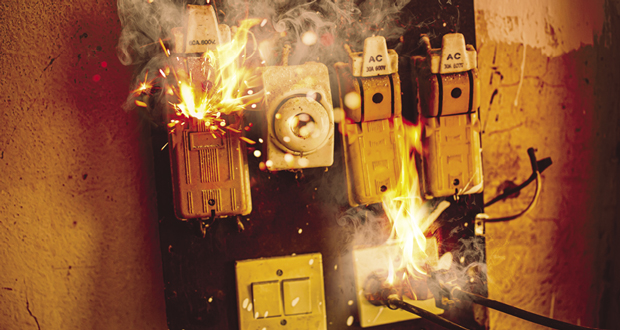FMs responsible for fire safety in residential buildings may have noted a new piece of legislation designed to reduce the chances of electrical fires in rented properties. Sean Miller, Electrician Programme Manager at Schneider Electric explains the change
New government legislation which came into force for England on the 1st June 2020 will require electrical installations in privately rented properties to be tested and inspected at least once every five years. The Electrical Safety Standards in the Private Rented Sector Regulations (2020) will require private landlords to enlist qualified electricians to complete inspections and provide certification to tenants – or face fines of up to £30,000.
While the risk of a fire can never be entirely eliminated, this new legislation will introduce and enforce increased levels of safety and ensure that one of the primary causes of fire – electrical malfunctions – is routinely tested for. There are a number of procedures and regulations in place for when a fire has already started, but this new law will help to reduce the chances of it ever getting to that point. After all, prevention is the best form of protection.
No safety procedure or response plan can ever fully prepare someone for the reality of a fire. However, a comprehensive prevention strategy and use of the latest technologies to quickly detect and respond to a fire can at least reduce the potential risk to both life and property.
DEFENSIVE DETECTION
A fire can spring from many sources around the home. While current standards do a good job of ensuring properties are well equipped to defend against fires created by overcurrent caused by overloads and short circuits, a certain level of risk still remains. In addition, electrical fires can also result from mistakes made during the installation process. Common hazards include loose cabling and ageing circuits that are not able to be detected by overcurrent protection. Indeed, a defective or worn insulation is the cause of 14 per cent of all electrical fires in buildings.
The danger of landlords only performing the bare minimum to protect their buildings is that, should a fire start from a source they haven’t accounted for, the loss and disruption to property and lives could be devastating.
For maximum protection, individuals need reliable, innovative products that excel beyond the minimum standards to prevent a fire from starting in the first place.
The pending Electrical Safety Standards in the Private Rented Sector Regulations will add to this safety from the start. It will require landlords to use qualified electricians when installing, repairing and maintaining systems, benefitting both the landlords and tenants by mitigating electrical issues and instilling greater confidence in equipment and standard.
The risk of cable insulation faults increases over time and the consequences can be severe. Low-intensity arc faults are more likely to occur in humid, dusty environments, causing injury and deadly fires if the proper precautions aren’t taken. Protection against insulation faults within cables can be assured by residual current devices (RCD), which are triggered by earth leakage currents exceeding 300mA.
In addition, final circuits in critical locations (as recommended in IEC 60364), should be protected by an arc fault detection device (AFDD). This is a circuit breaker that automatically cuts off an electricity supply when it detects an arc fault in the circuit. By immediately ceasing the supply of power, AFDDs stop arc faults from reaching the high temperatures needed for fires to break out.
As well as ensuring that private tenants feel more safe and secure in their homes, the new legislation represents an opportunity for electricians to secure more work and develop their skills and expertise. Going forward, as the demand for electricians in the private rented sector rises, we can expect to see greater opportunity for electrical engineers to win long running contracts with landlords and property managers.
Fire may be a risk, but it is not unavoidable. This new legislation promises greater peace of mind for private tenants by ensuring that electrical standards are met and hazards reduced. With expert knowledge and the correct approach to electrical fire prevention, a fire can be extinguished before any damage is done.
KEY POINTS & TAKEAWAYS:
- The Electrical Safety Standards in the Private Rented Sector Regulations (2020) came into power on the 1st June 2020.
- The legislation will require that private landlords hire qualified electricians when installing, repairing, inspecting and maintaining systems and that inspections are carried out at least once every five years.
- Landlords who do not carry out an inspection or provide certification of one could face fines of up to £30,000.
- Although there is never a guarantee that fire won’t break out, the new regulations will ensure that electrical standards in rented properties are increased, so the risk of faults is decreased.
- Regulations will give tenants greater peace of mind by ensuring that risk areas, such as cabling and insulation, are routinely inspected.
- The legislation will boost job opportunities for electrical engineers as private landlords will now be required to hire skilled professionals to carry out works.
- The use of fire prevention tools and devices, such as arc fault detection devices (AFDD) will further increase safety and reduce the likelihood of fires.





